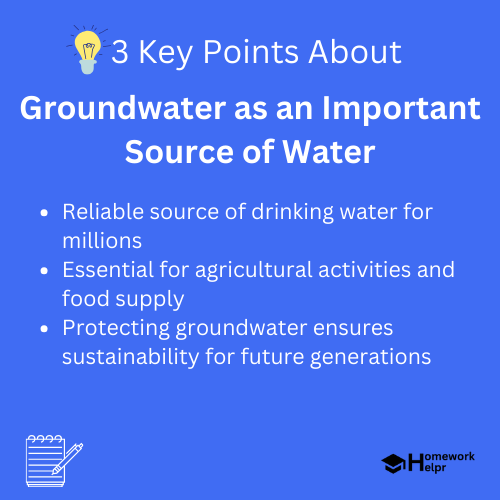📝 Summary
Groundwater is a vital resource that plays a significant role in our lives, serving as a primary source of freshwater for drinking, irrigation, and industrial processes. It resides beneath the Earth’s surface in aquifers, which are essential for ecosystems and agricultural activities. However, groundwater faces challenges such as over-extraction and contamination. Protecting this crucial resource requires conservation, minimizing pollution, and enhancing recharge. Recognizing its importance can drive responsible usage and help us sustain groundwater for future generations. The need for sustainable management is critical for our health and agriculture.
Groundwater as an Important Source of Water
Groundwater is a vital resource that plays a significant role in our daily lives. It is the water that resides beneath the Earth’s surface, filling voids and fractures in soil and rock. This hidden treasure serves as a crucial supply of freshwater for various purposes, including drinking, irrigation, and industrial processes. Understanding the importance of groundwater can help us appreciate its value and encourage responsible usage.
What is Groundwater?
Groundwater is defined as the water that infiltrates the soil and rock layers of the earth, usually accumulating in aquifers, which are geological formations that can yield significant amounts of water. The process begins when precipitation, such as rain or snow, falls to the ground. This water seeps through the soil and underlying rock until it reaches an impermeable layer, where it collects and forms a reservoir.
Groundwater is an essential component of the Earth’s hydrological cycle. It supports ecosystems, maintains stream flow during dry periods, and provides drinking water for humans and animals alike. The depth and availability of groundwater can vary widely from one region to another, affecting how communities access and manage this resource.
Definition
Aquifer: A geological formation that can store and transmit water. Permeable: A material that allows water to pass through it.
Importance of Groundwater
Groundwater is crucial for several reasons. Primarily, it serves as a reliable source of drinking water for millions of people around the world. In many regions, especially in arid and semi-arid areas, groundwater is the only viable source of fresh water. With increasing population and urbanization, demand for freshwater continues to rise, making groundwater more vital than ever.
Furthermore, groundwater is essential for agricultural activities. Farmers rely on it for irrigation, helping to grow crops that feed our communities. The ability to tap into groundwater allows for the cultivation of food in areas where surface water may be scarce or unreliable.
- Drinking water supply.
- Agricultural irrigation.
- Industrial processes.
- Maintaining ecosystem health.
How is Groundwater Recharged?
Groundwater is continuously replenished through a process known as recharge. This occurs when precipitation infiltrates the ground and percolates through soil layers, reaching aquifers below. Various factors can influence this process:
- Climate: Areas with frequent rainfall experience more recharge.
- Soil Type: Sandy soils permit faster infiltration than clay soils.
- Vegetation: Plants can slow down water runoff, allowing more water to seep into the ground.

Challenges Facing Groundwater Sources
Despite its importance, groundwater faces numerous challenges. Over-extraction is one of the most critical issues, as excessive pumping can lead to a decline in water levels and damage aquifers. In many regions, groundwater is being withdrawn faster than it can naturally be replenished, posing a serious threat to future water availability.
Furthermore, contamination of groundwater is a growing concern. Pollutants such as chemicals, heavy metals, and bacteria can seep into aquifers, rendering the water unsafe for consumption. Agricultural runoff, industrial waste, and improper disposal of hazardous materials contribute to this problem.
Definition
Contamination: The introduction of harmful substances into a resource, resulting in deterioration of quality. Over-extraction: The removal of groundwater at a rate faster than it can be replenished.
Ways to Protect Groundwater
Protecting groundwater resources is essential for ensuring a sustainable water supply for future generations. Here are some effective strategies:
- Conservation: Use water efficiently to reduce demand on groundwater sources.
- Pollution Control: Minimize the use of harmful chemicals and ensure proper waste disposal.
- Reforestation: Plant trees and maintain vegetation to enhance water absorption.
❓Did You Know?
Did you know that approximately 2.5 billion people rely on groundwater for their daily water needs? This underlines the importance of preserving this precious resource!
Real-World Examples of Groundwater Use
There are various instances around the world where communities have successfully utilized groundwater:
Examples
In California, farmers extensively use groundwater from aquifers for agriculture, especially during drought periods when surface water is limited.
Examples
In Bangladesh, millions of people depend on groundwater extracted from tube wells for drinking water, demonstrating its role in public health.
These examples highlight the significance of managing groundwater sustainably to continue benefiting from this resource.
Conclusion
Groundwater is an essential part of our water supply, providing for drinking, agricultural, and industrial needs. Understanding its importance helps us recognize the need for responsible usage and protection from over-extraction and contamination. By implementing conservation strategies and promoting public awareness about the value of groundwater, we can ensure that this vital resource remains available for future generations. Let’s commit to protecting our groundwater for a sustainable and healthy future!
Related Questions on Groundwater as an Important Source of Water
What is groundwater?
Answer: Groundwater is water that resides below Earth’s surface.
Why is groundwater important?
Answer: It serves as a reliable freshwater source for various needs.
What are the challenges facing groundwater?
Answer: Over-extraction and contamination threaten groundwater availability.
How can we protect groundwater?
Answer: Conservation, pollution control, and reforestation are effective strategies.
